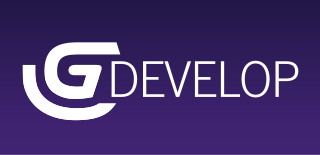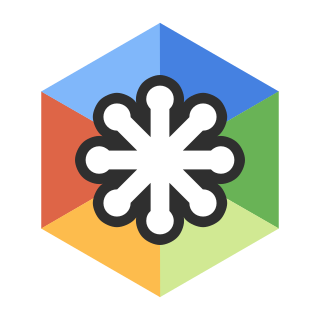In computing, cross-platform software is computer software that is designed to work in several computing platforms. Some cross-platform software requires a separate build for each platform, but some can be directly run on any platform without special preparation, being written in an interpreted language or compiled to portable bytecode for which the interpreters or run-time packages are common or standard components of all supported platforms.
C++Builder is a rapid application development (RAD) environment for developing software in the C++ programming language. Originally developed by Borland, as of 2009 it is owned by Embarcadero Technologies, a subsidiary of Idera. C++Builder can compile apps for Windows, iOS, macOS, and Android. It includes tools that allow drag-and-drop visual development, making programming easier by incorporating a WYSIWYG graphical user interface builder.

A graphical user interface builder, also known as GUI designer or sometimes RAD IDE, is a software development tool that simplifies the creation of GUIs by allowing the designer to arrange graphical control elements using a drag-and-drop WYSIWYG editor. Without a GUI builder, a GUI must be built by manually specifying each widget's parameters in the source code, with no visual feedback until the program is run. Such tools are usually called the term RAD IDE.
Mobipocket SA was a French company incorporated in March 2000 that created the .mobi e-book file format and produced the Mobipocket Reader software for mobile phones, personal digital assistants (PDA) and desktop operating systems.

Adobe AIR is a cross-platform runtime system currently developed by Harman International, in collaboration with Adobe Inc., for building desktop applications and mobile applications, programmed using Adobe Animate, ActionScript, and optionally Apache Flex. It was originally released in 2008. The runtime supports installable applications on Windows, macOS, and mobile operating systems, including Android, iOS, and BlackBerry Tablet OS.
NS Basic is a family of development tools developed and commercially marketed by NSB Corporation in Toronto, Ontario, Canada for iOS, Android, Microsoft Windows, MacOS, Linux, BlackBerry OS, WebOS, Newton OS, Palm OS, Windows CE and Windows Mobile.

The Android SDK is a software development kit for the Android software ecosystem that includes a comprehensive set of development tools. These include a debugger, libraries, a handset emulator based on QEMU, documentation, sample code, and tutorials. The SDK is part of the official Android Studio IDE but its various tools and resources can be used independently.
Basic4ppc is a programming language originally for Pocket PC handheld computers running Windows Mobile operating system, by Anywhere Software. Since 2014, B4x was renamed, and currently, 2023, supports multiple devices and their OS, including desktop and mobile solutions with development adaptions for these environments. The language is based on a BASIC-like syntax, taking advantage of Microsoft's .NET technology, to allow additional libraries, graphical user interface design of windows forms, rapid application development (RAD), and .NET framework compatible compilation. The language implements a unique way of adding objects to a program without being object-oriented. Its advantages are simplicity, development pace and the integration with .NET framework. A special version of the integrated development environment (IDE) allows developing straight onto the Windows Mobile device or. With the demise of Windows Mobile operating system and the devices running it Basic4PPC came to the end of its life in about 2012. For owners of Basic4PPC it remains a useful Windows-desktop BASIC compiler as it runs code directly in the Windows environment and it can compile a project to a Windows 'exe' file for use as a Windows program.

The Xojo programming environment and programming language is developed and commercially marketed by Xojo, Inc. of Austin, Texas for software development targeting macOS, Microsoft Windows, Linux, iOS, Android, the Web and Raspberry Pi. Xojo uses a proprietary object-oriented language.
Codename One is an open-source cross-platform framework aiming to provide write once, run anywhere code for various mobile and desktop operating systems. It was created by the co-founders of the Lightweight User Interface Toolkit (LWUIT) project, Chen Fishbein and Shai Almog, and was first announced on January 13, 2012.

Basic4Android is a rapid application development tool for native Android applications, developed and marketed by Anywhere Software Ltd.

Intel Galileo is the first in a line of Arduino-certified development boards based on Intel x86 architecture and is designed for the maker and education communities. Intel released two versions of Galileo, referred to as Gen 1 and Gen 2. These development boards are sometimes called "Breakout boards".

Puffin Browser is a remote browser developed by CloudMosa, an American mobile technology company founded by Shioupyn Shen.

IBM MaaS360 is a SaaS Unified Endpoint Management (UEM) solution offered by IBM that manages and protects any existing endpoint including laptops, desktops, mobile devices and apps, wearables, IoT and purpose built devices and allow protected, low risk access to company resources. IBM Security MaaS360 with Watson integrates with current security platforms owned by different companies. It’s AI powered analytics removes friction by reducing actions required from the device user.

Collabora Online is an open source online office suite based on LibreOffice, enabling web-based collaborative real-time editing of word processing documents, spreadsheets, presentations, and vector graphics. Optional apps are available for desktops, laptops, tablets, smartphones, and Chromebooks.

GDevelop is a 2D and 3D cross-platform, free and open-source game engine, which mainly focuses on creating PC and mobile games, as well as HTML5 games playable in the browser. Created by Florian Rival, a software engineer at Google, GDevelop is mainly aimed at non-programmers and game developers of all skillsets, employing event based visual programming similar to engines like Construct, Stencyl, and Tynker.

Boxy SVG is a proprietary vector graphics editor for creating illustrations, as well as logos, icons, and other elements of graphic design. It is primarily focused on editing drawings in the SVG file format. The program is available as both a web app and a desktop application for Windows, macOS, ChromeOS, and Linux-based operating systems.










